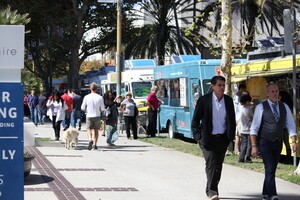Food Trucks Give City Regulations a Failing Grade

The lines of people are long. The line of trucks is even longer.
Hungry businessmen and women hurry out of their offices each day to secure a place in line at one of the many food trucks lining the streets of Los Angeles, waiting to try a little piece of Italy, Asia and the Mediterranean.
Rosa Graziano is one of those several hundred food truck owners in Los Angeles. To her, what began as a family tradition of serving zeppoles at church in New Jersey became her first business.
"We grew up in the deli business," Graziano said while working in her food truck, Rosa Bella Cucina. "On Sundays my mom and my aunt were in charge of the zeppole stand at church."
It was her fond memories with her family that gave Graziano the idea for her business when she moved to Los Angeles. She designed a custom food truck and Rosa's Bella Cucina was up and running.
Stories like Graziano's are common in Los Angeles. Since 2008, the food truck trend has been growing steadily. Today there are an estimated three hundred food trucks in Los Angeles alone, all competing to get a piece of the American dream.

Though it's a booming industry, the market has become saturated. Heavy competition and strict regulations have made it difficult for food truck owners to not only get their trucks running but also keep them in business.
The L.A. County Health Department in conjunction with the L.A. City Council along have set in place regulations to keep food trucks accountable for the food they serve and the service they provide to their patrons. Regulations include proximity to restrooms for employees as well as a sanitary grading system for the trucks.
The grading system that was implemented last year is a source of major concern for food truck owners. Although the restaurateurs agree the grading system helps ease the mind of consumers, owners like John Kim say the frequent visits from health inspectors can become a nuisance.
"It's a double-edged sword because it really hinders our business," Kim said. "They not only grade you once, but repeatedly visit you on your truck while we're at our peak hours. We've got to constantly be under some sort of inspection."
The city ordinance for inspections requires trucks to be reviewed twice a year, but Kim said his truck has been visited four times in the last two months.
Kim is the owner of New York Galbi, a food truck serving a fusion of Korean-Mexican fusion dishes for the last three years. Kim's truck sees most of its business during lunch hours, but Kim says he is always concerned health inspector may be lurking around.
"We have to almost stop [working] because we don't want to get a lower grade than the one we got before," Kim said.

Besides the unscheduled visits, bathroom regulations seem to be the biggest cause for headaches with truck owners though.
The state rule says that if a truck is parked for longer than an hour, they must have permission to use an appropriate restroom that is within 200 ft.
"We feel like a fugitive," Kim said. "We feel insecure about not having authorized bathroom access, and that creates a lot of jitter."
Truck owners find themselves looking over their shoulders for inspectors and sometimes get tickets for being just a foot shy of the 200 ft. ordinance.
"We not only have to worry about running our business with the proper menu and pricing, but we also have to worry about having a bathroom wherever we go." Kih Elbat, the owner of Shwarma's Truck, a Mediterranean themed vendor quips, "Why within 200 ft.? Is it just to make our lives harder?"
Matt Geller, CEO of the Southern California Mobile Food Vendors Association, understands the need for regulations but says there is a need for comprehensive policy.
"We want direct policy, written out so it is easy to understand and linked to relevant code sections that provide us with their authority," Geller said.
Geller believes vendors are being cited and penalized for regulations that don't exist.
"It says you have to be 200 ft. of a restroom, if you're 201 ft. then we are going to shut you down," Geller says. "That's fine, but if on the other end you're asking for things using your authority that does not exist in the code then we have some serious issues."
Geller remembers one incident where a community event permit was pulled because there was more than one truck on a piece of private property. When asked to cite the code the officer failed to do so it simply did not exist, Geller said.
The city restrictions, whether warranted or not, disrupt business and in turn disrupt revenues.
"I don't even know what they legally state as the reason why, but once [the police] come up to you and say you have to get out of here," Graziano said, you're like 'okay, I guess I gotta go.'"
City officials have yet to get back to KCET on the issue.
The policies, strict regulations and unclear codes, while meant to aid the industry and ensure consumer confidence, just cause problems, according to the food vendors.
Food truck owners just want to get back to doing what they do best. Serving a little piece of their dream to hungry eaters every day.
"That's what's exciting, these human experiences," Graziano said. "It's so much about a culture and an experience and so much about bringing you into my home. That's what I am trying to do."

Sara Ramsey and Aja Dang are graduate students at the University of Southern California's Annenberg School for Communication & Journalism, which has partnered with KCET-TV to produce this blog about policy in Los Angeles.